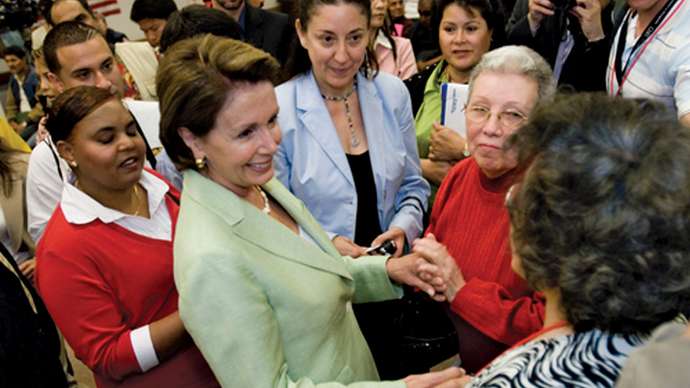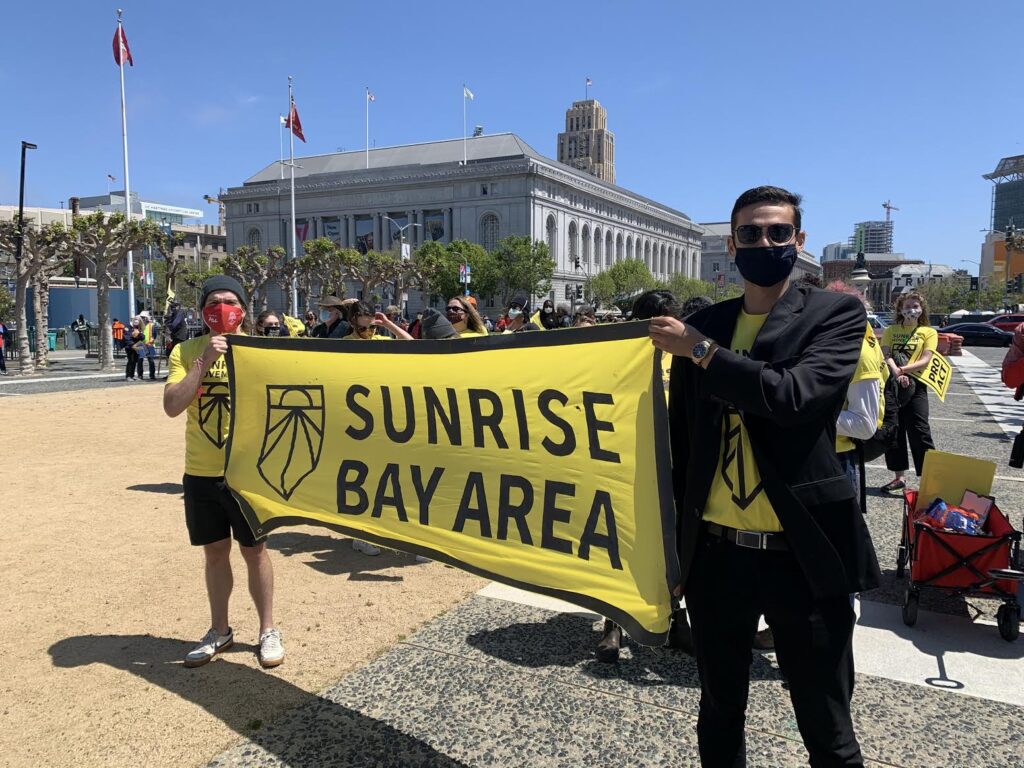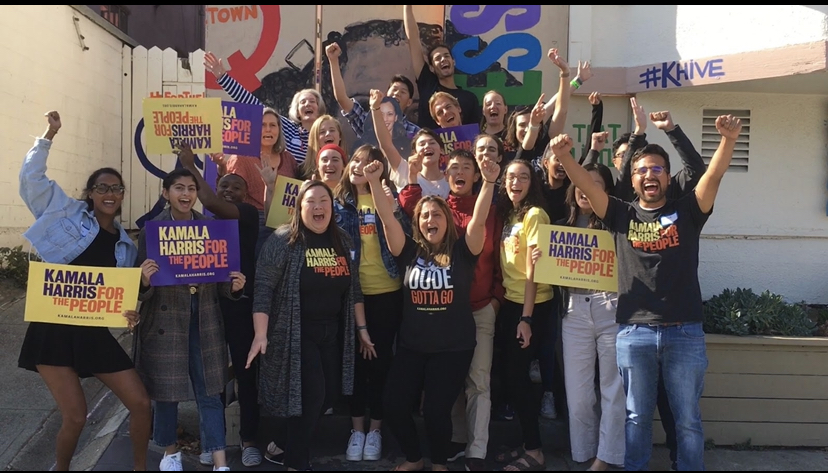
Eric Curry has launched his campaign for San Francisco’s 12th Congressional District seat, currently occupied by House Speaker Nancy Pelosi. Photo: Courtesy Eric Curry
SAN FRANCISCO, CA – Sometimes referred to as the “underdog” and “unlikely candidate,” Eric Curry, a 27-year-old San Franciscan is running for San Francisco’s 12th Congressional District seat. He officially launched his campaign to win the congressional seat once held by House Speaker Nancy Pelosi (D- San Francisco) in the Bay Area on Monday April 19, 2021.
According to the Bay Area Reporter, Curry, who would be the first gay Latino candidate to represent the district, is a democrat deeply invested in the rights of the working class, LGBTQ+ community and eco-friendly sustainability. He announced his candidacy after Pelosi hinted at the possibility that 2022 may mark the end of her time serving as House speaker. Pelosi’s suggestion of stepping down created debate as to whether she should also retire from Congress altogether the following year and opened the door for Curry to run for Congress. Curry told the Bay Area Reporter that he is “focused on raising his name recognition with voters and seeking donations” in order to have a fighting chance at surviving the primaries on June 7, 2022.

Speaker of the House Nancy Pelosi congratulating new U.S. citizens.
Image Source: Office of U.S. House of Representative Speaker Nancy Pelosi
Curry states that he’s running for Congress in his hometown of San Francisco because “we simply cannot wait any longer for Medicare For All, housing reform, a Green New Deal and student loan forgiveness.” He feels that the decisions are being made by politicians who won’t be around in 20 years to deal with the consequences of their decisions.
“It will be my generation, our kids and our grandchildren who will bear the brunt of the climate crisis, the healthcare crisis, the looming economic crisis — and thus, we deserve a seat at the table,” he says.

Courtesy Eric Curry
Curry pledges that on day one in office, he will cosponsor H.R. 794 – The Climate Emergency Act.
“I’m quite baffled that our current representative, whom I deeply respect, doesn’t seem to understand the urgency of the climate crisis,” he explains. “Once Congress acts on climate change, we can address the student loan crisis, Medicare For All and raising the minimum wage. But my priority is making sure we still have a planet to live on in 20 years.”
According to Mercy Corps, the impacts of climate change do affect every continent and country, but it doesn’t affect every demographic equally. The impoverished populations throughout the globe face the heavy social burdens of poverty and oppression while being forced to deal with the harshest consequences of environmental changes. Those who live in poverty have the least resources to cope with the struggle to earn a living, care for their families and live in a stable environment that has not been impacted by the climate.
The Climate Emergency Act would allow the president to declare a national emergency as result of climate change under section 201 of the National Emergencies Act (50 U.S.C. 1621), making it possible for the president to:
(A) Upgrade public infrastructure, create nationwide access to clean energy and water, access to public transportation and high-speed broadband internet;
(B) Retrofit millions of homes, schools, business offices and industrial buildings to reduce the daily carbon footprint;
(C) Increase investments into public health response in preparation for extreme climatic events;
(D) Protect the vast wetlands, forests and public lands that may be in danger due to extreme weather;
(E) Create economical empowerment opportunities for farmers and rural communities by supporting regenerative agriculture and investing in American based food systems that support farmers, agricultural workers, healthy soil and climate resilience;
(F) Encourage transformative development of the American industrial base, creating high wage paying manufacturing jobs, including expanding the manufacturing of clean technologies that reduce industrial pollutions; and
(G) Establish new employment programs as needed.
Curry has put his activist background to work in organizing with grassroots progressive organizations across the country during the 2020 elections. He was a volunteer on Kamala Harris’ Presidential Campaign, participating in her organizing academy and later organizing for the Biden/Harris ticket. As a native Spanish speaker, Curry’s skills were useful for native Texans and Georgians as he was also a volunteer for the Warnock and Ossoff Senate campaigns. Due to his experience, he understands firsthand how money can influence elections.

“There is no place for corporate money in politics. None. Corporations don’t vote; people do. How on earth can I make the best decisions for the American people if my judgment is clouded by corporate interests?” Curry asked Mills students in a campaign email.
Curry wants people to know that he is committed to “running a campaign of, by, and for the people.” If elected, the welfare of his constituents, not the corporations, will guide all of his actions in Congress.
According to Caltech Science Exchange, political action committees (PACs) is formed to represent business, labor or ideological interests by individuals privately raising money that will be donated to a political campaign. Those funds are then used for campaigns that sway an election either for or against targeted candidates, ballot initiatives or legislation that affect public policies by either altering legislators’ roll call voting or influencing election outcomes. Political candidates will often raise money to fund their campaigns and to demonstrate the breadth of their support through the aid of PACs. Campaign finance laws dictate who can contribute to a campaign, how much money they can contribute and how the funding may be used at the local, state and federal levels. Campaign funding can come from individual donors, political party committees and PACs.
When PACs alter legislators’ roll‐call voting behavior, often called “roll-call buying”, a lawmaker will choose to simply vote present when being persuaded by PACs funding. Roll‐call vote-buying often operates in a quid‐pro‐quo fashion, which can limit the PACs’ influence on public policy.
When PACs influence election outcomes, a particular candidate will author a vote in favor of legislation that favors the PACs’ interest, providing specific benefits to the donating PACs as that candidate serves in office.
One social issue that PACs tend to influence is immigration policies. Curry’s stances on the detention centers at the Southwestern American borders and how the issue made him feel as the child of immigrants were made clear.
“My mother came to the United States in the midst of a horrific civil war in El Salvador. My Abuelito [grandfather] and Abuelita [grandmother] came from nothing, but worked hard to provide the resources for my mother and her sisters to have the privilege of being able to immigrate to the United States legally,” Curry says.
Curry reflects upon how many immigrants are not afforded the same opportunities as his mother and her family were — and that it doesn’t make them any less deserving of the American Dream.
“I strongly oppose the detention centers at the border. The migrants at the border are not criminals; they are people just like you and me who are fleeing oppression, natural disasters, and corruption — and are ready to work hard and contribute to our economy,” Curry says.

Photographer: Gary Mark Smith – www.streetphoto.com
The El Salvadorian Civil War ravaged the Central American state country of El Salvador, where approximately 75,000 Salvadorans died between 1980 to 1992. The two primary actors were a Marxist-Leninist guerrilla group called the Farabundo Martí National Liberation Front (FMLN) and the government of El Salvador. According to Aljazeera, FMLN guerrillas used kidnappings, bombings and terrorist tactics that involved killing mayors and informants. The civil war between the FMLN and the government of Salvador caused the civilians caught in the crossfire to become alienated and seek refuge abroad to avoid execution by the government’s death squads. Curry’s family came to the U.S. seeking asylum and escaping the violence.
As a third-generation immigrant whose family came to this country fleeing civil unrest and oppressive governments, Curry has been working hard to become a trailblazer for future generations of Americans. This is the story of many South and Central American and Caribbean immigrants seeking asylum at our nation’s borders. Especially Salvadorian asylum seekers, who face execution upon their return to their native home. Salvadoran gangs prey on deportees who have very little to no protection by authorities upon return.
While talking about military actions being carried out against civilians, Curry opened up about police reform and the militarization of law enforcement in America and expressed his support of potentially abolishing the 1033 program that gives local law enforcement military-grade weapons and gear.
“I absolutely support police reform and if elected, will fight from day one to support policies ending qualified immunity and increasing implicit bias training for law enforcement,” said Curry. “I also fully support the abolishment of the military surplus equipment transfer program [1033].”
When dealing with the issue of military surplus and what many considered the “worsening drug crisis,” the 101st Congress enacted the National Defense Authorization Act in 1990. Section 1208 of the NDAA made it possible for the Secretary of Defense to “transfer to Federal and State agencies personal property of the Department of Defense, including small arms and ammunition, that the Secretary determines is suitable for use by such agencies in counter-drug activities; and excess to the needs of the Department of Defense.” It was originally labeled the 1208 Program, until 1996 when Congress replaced Section 1208 of the act with Section 1033, according to News Week.
Curry is jumping headfirst into humanitarianism in politics. In refusing PACs money, standing in support of abolishing the 1033 program, fighting to release asylum seekers at the border, agreeing with the HR 794 Climate Emergency Act, advocating for a minimum wage increase, championing health care for all and eliminating student loan debt, Curry is keeping in tradition with the liberalism of current House Speaker Pelosi.

